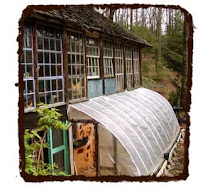Blog #2
So, how to begin? The firm foundation on which we will build must be a clear understanding of exactly what we want to create. I have several working definitions of a Paradise Garden. The simplest is: 'an environment in which everything we need is there for the taking.' This encapsulates the description of Eden in Genesis: it contains 'every tree that is pleasant to the sight, and good to eat', and they are freely given. But of course humans are not just passive recipients of this bounty - we have a role to play: 'to dress it and keep it.' This role, or niche, is very different from human activity after the Fall, when we must earn our living 'by the sweat of our brow.' The distinction is clearly between a life in cooperation with nature, working with what is given, and a life which wrests from nature what we 'want.' The latter is the sweaty work of agriculture, transforming the environment and "making the earth say 'beans.'" The former is the gentle pastime of gardening.
Another definition of Paradise might be: 'a botanical garden of useful plants, grown ecologically and arranged ornamentally.' 'Grown ecologically' is making the same point as 'there for the taking'; namely, that the plants are growing naturalized in their preferred habitat, and thus do not require our 'work.' This definition also brings in the concept of beauty, which may be taken as shorthand for '(also) provides for our non-material needs.' To reiterate: agriculture involves deciding what we want to produce, then clearing, plowing, fertilizing, sowing, cultivating and other sweaty work. Whether this is regarded as sacred activity or just a job, it is a world away from the Paradise Garden which we 'dress and keep.'
But since we are presently outside the Paradise Garden, our immediate task is to begin developing it. This involves effort which, if you were being paid to do it for someone else, would be 'work.' (Doing it for myself, I have always thought of it as 'play' - for the distinction, see the Paradise Gardening essay on the website). Some changes must be made. Even if you are fortunate enough (as I am) to live in a relatively undisturbed 'natural' area, the 'carrying capacity' for humans is nowhere near enough to support our population. We need to coax more food, etc. out of the environment without destroying it: 'ecosystem manipulation' vs. 'ecosystem transformation.'
So (again) how to begin? There is no instructional manual (but a vast amount of relevant information is available.) The goal is not just to develop a Paradise environment, but to develop a way of life leading to same: we are trying to 'naturalize' ourselves. It is in the actions of developing and maintaining (and being maintained by) the Garden that we come home to Gaia.
It is a fundamental tenet of this philosophy that nothing is really necessary except a piece of land. Of course, a small collection of hand tools is almost indispensable, but if you stick to what is really necessary, the expense can be trivial. The point is not to fall into the trap of thinking that you need to make money now in order to (get the stuff which will enable you to) stop needing money later. In a future blog I will get into some ideas about money-making (E.g. how to move towards Paradise when you still have to pay off the mortgage), but for the moment, let's assume you are debt free.
There may be a dwelling, or maybe not. If not, creating one will be a primary concern. This can cost a lot of money - enough to lock you into years of wage servitude - or very little. See, for example, the $ Fifty Underground House Book, or pictures and forthcoming information on this website of the house my partner Steve built for $100 using saplings and clay from the site, or the book Shelters, Shacks and Shanties, or any number of books on 'vernacular architecture' around the world. It all depends on what resources your site and neighborhood offer: clay, rock, timber, saplings, sod?
In this, as in all things, it is important and indeed inspiring to remember that people have lived on this land for thousands of years. So a primary thing to learn (and Paradise Gardening is all about learning) is: how did they do it? Not that many of us are interested in a stone-age lifestyle, or even that of the 'pioneers' a few hundred years ago, but what kind of dwellings did they construct, and what did they eat? Our goal is not to imitate the past but to build on it.
So, the first and most obvious thing to learn is the 'potential natural vegetation' of your site.
To be continued.
Thursday, May 7, 2009
Subscribe to:
Posts (Atom)
